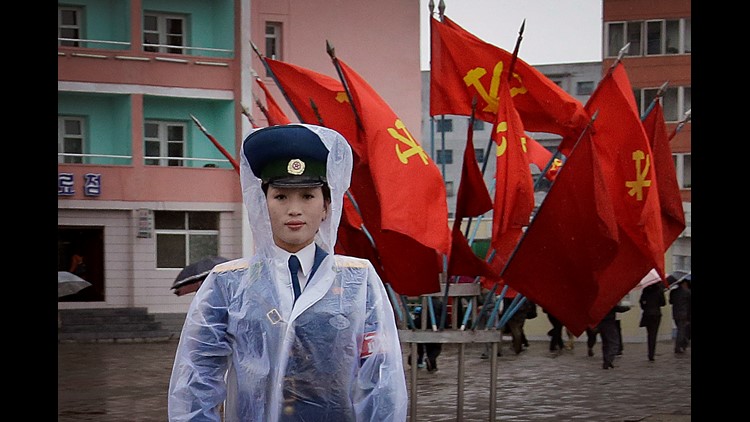TOKYO — When North Korea’s first party congress in 36 years kicks off Friday, it is certain to feature all the pageantry, saber-rattling and over-the-top rhetoric the world has come to expect of the reclusive and erratic regime.
![AP NORTH KOREA CONGRESS I PRK [image : 83960742]](http://www.gannett-cdn.com/media/2016/05/05/USATODAY/USATODAY/635980324302835510-AP-North-Korea-Congress.jpg)
But count on serious business, too. And possibly even good news for the outside world.
Kim Jong-un, the nation’s 33-year-old leader, is expected to consolidate power and gain formal approval for his policy of Byongjin — simultaneous development of both the economy and nuclear weapons.
That will replace the Songun, or “military first,” policy of his late father, Kim Jong-il, whom the young leader succeeded in 2011.
“The congress is intended to revive the party and roll back the military. Songun has bankrupted North Korea and made it permanently dependent on China,” said Robert E. Kelly, professor of political science at Pusan National University, in South Korea.
“This could be good for the United States, because it could mean less money for the Korean Peoples’ Army. That would also be good news for North Koreans, because resources would be freed up from the military that could go to the civilian sector,” Kelly said.
![Relatives seek rescue of Japanese mother, sister abducted by North Korea [oembed : 83961732] [oembed : 83961732] [oembed : 83961732] [oembed : 83961732] [oembed : 83961732] [oembed : 83961732] [oembed : 83961732] [oembed : 83961732]](/Portals/_default/Skins/PrestoLegacy/CommonCss/images/smartembed.png)
Although the agenda remains secret, the 7th Workers’ Party of Korea Congress is expected to last four to five days. The last such meeting was held in 1980, when the country’s founder and current leaders grandfather, Kim Il-sung, was still in power.
Kim Jong-un is expected to boast of improvements under his leadership to the economy and progress in developing nuclear weapons and long-range missiles.
![AFP 551563507 I POL PRK [image : 83960778]](http://www.gannett-cdn.com/media/2016/05/05/USATODAY/USATODAY/635980326847977362-AFP-551563507.jpg)
North Korea, formally known as the Democratic People’s Republic of Korea, or DPRK, has conducted four nuclear weapons tests, the most recent in January.
It also conducted an apparently successful test in February of a missile with sufficient range to reach parts of the continental United States. A more recent missile test apparently failed.
Both the nuclear weapons and missile programs are in violation of international treaties and have resulted in tough new sanctions against North Korea.
![Report: North Korean missile launches fail [oembed : 83960710] [oembed : 83960710] [oembed : 83960710] [oembed : 83960710] [oembed : 83960710] [oembed : 83960710] [oembed : 83960710] [oembed : 83960710] [oembed : 83960710] [oembed : 83960710]](/Portals/_default/Skins/PrestoLegacy/CommonCss/images/smartembed.png)
Nonetheless, the tests may have given Kim enough leverage with military hawks at home to attempt a genuine easing of relations with South Korea and the United States, said Hajime Izumi, a North Korea expert at the Institute for International Strategy at Tokyo International University.
“It’s highly likely that Kim will be proclaimed a ‘great leader,’ separate from his father and grandfather and this will allow him to focus on the economy and reconciliation. I’m slightly optimistic,” Izumi said.
The nation of 25 million is one of the world’s most impoverished, with a per capita income of just $1,800 (compared to $56,300 in the U.S.).
North Korea also remains one of the world’s most closed countries, but Kim has invited large numbers of foreign press to witness the party congress. Arriving journalists already have reported a gleaming new airport, as well as more and newer vehicles on Pyongyang’s streets. They also report seeing thousands of people practicing for the huge parades and mass outdoor rallies that accompany important holidays and official events in the DPRK.
North Korea tested what it claimed was its first hydrogen bomb explosion in January, although the U.S. government said the blast did not appear powerful enough to be a hydrogen bomb. Experts believe the North is still many years away from developing a nuclear warhead small enough to fit on a missile, and a guidance system accurate enough to successfully deliver the weapon.
![North Korea claims to have successfully tested a hydrogen bomb [oembed : 83960688] [oembed : 83960688] [oembed : 83960688] [oembed : 83960688] [oembed : 83960688] [oembed : 83960688] [oembed : 83960688] [oembed : 83960688] [oembed : 83960688] [oembed : 83960688]](/Portals/_default/Skins/PrestoLegacy/CommonCss/images/smartembed.png)
Several tests of an intermediate-range missile, the Musudan, in the run-up to the party congress apparently failed.
![North Korea Overview [oembed : 83960666] [oembed : 83960666] [oembed : 83960666] [oembed : 83960666] [oembed : 83960666] [oembed : 83960666] [oembed : 83960666] [oembed : 83960666] [oembed : 83960666] [oembed : 83960666]](/Portals/_default/Skins/PrestoLegacy/CommonCss/images/smartembed.png)



